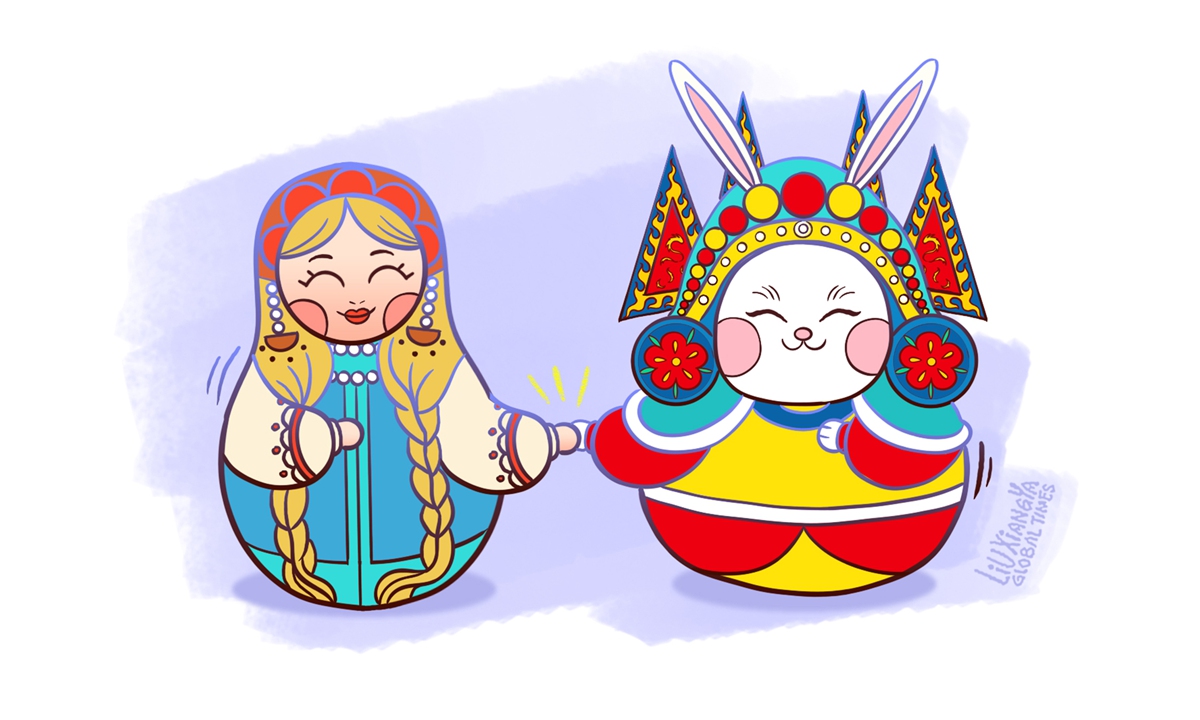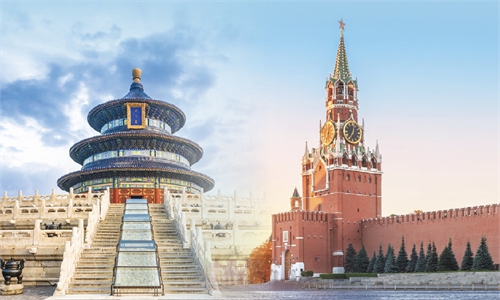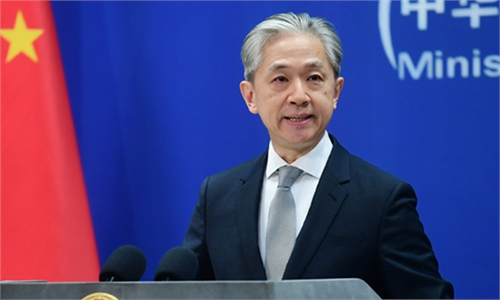ARTS / CULTURE & LEISURE
China-Russia cultural ties bolster friendship

Illustration: Liu Xiangya/GT
As we commemorate the 75th anniversary of the establishment of diplomatic relations between China and Russia, the China National Traditional Orchestra and Osipov State Russian Folk Orchestra joined hands to inaugurate the China-Russia Years of Culture in Beijing on Thursday. Within the framework of this cultural year, both countries have planned over 230 cultural and artistic activities for 51 cities in China and 38 cities in Russia.
Since the beginning of the year, China and Russia have embarked on a vibrant journey of cultural exchanges within the framework of the cultural year. These exchanges have encompassed exhibitions, folk culture showcases, film screenings, and art exchanges, among other activities.
For instance, from January 16 to 19, the China-Russia Calligraphy and Fine Arts Exhibition was held in Moscow, the capital of Russia. Russian people witnessed over 130 exquisite artworks created by well-known artists from both countries, fully experiencing the beauty of artistic exchange between China and Russia.
From February 9 to 18, grand celebrations were held at Revolution Square in the center of Moscow to welcome the arrival of Chinese New Year -the Year of the Dragon. Moscow residents and tourists immersed themselves in Chinese folk culture by enjoying various delicacies, writing Spring Festival couplets, making paper-cut window decorations and appreciating tea ceremonies.
On March 15 and 17, celebrations for the Maslenitsa festival, a traditional Russian festival celebrating the end of winter and the arrival of spring, were held in Beijing and Xi'an, capital city of Northwest China's Shaanxi Province. Chinese people enjoyed Russian folk songs and dances, tasted Russian pancakes, and gained further understanding of traditional Russian customs and culture through colorful activities.
On April 8, an exhibition of oil paintings themed on the Xizang Autonomous Region by Chinese painter Han Yuchen opened at the Tretyakov Gallery in Moscow, Russia, vividly showcasing the daily life, cultural traditions, and beautiful natural scenery of the region to Russian audiences.
On March 15, the Russian movie The Challenge, the world's first-ever movie filmed on the International Space Station, was released in the Chinese mainland. Shortly after, several Chinese films participated in the 46th Moscow International Film Festival held in April. These cultural exchanges have built a bridge for friendly cultural exchanges between the two countries.
On the eve of his two-day state visit to China, which started on Thursday, Russian President Vladimir Putin stated in a written interview with the Xinhua News Agency that Russia and China are promoting the prosperity of both nations through expanded equal and mutually beneficial cooperation in economic and cultural fields.
Putin said that Russia and China have been inextricably linked for centuries, both by an extensive common border and by close cultural and people-to-people ties.
In the interview, he listed a lot of examples about the mutual interests in cultural exchanges between the two countries' peoples, and he expressed his personal interest in Chinese martial arts.
Putin noted that approximately 90,000 Russian students at various educational levels are learning Chinese, and tours and exhibitions involving Chinese artists have been highly successful. The number of tourists traveling between the two countries continues to surge, with over 730,000 Russian citizens visiting China in 2023.
"I know that people in China are also keen to get acquainted with Russian literature, art and traditions. Our eminent theater groups and musicians regularly perform in China, museums organize their exhibitions, and Russian films are run in cinemas. We are most willing to introduce our Chinese friends to the historical, artistic and cultural heritage of multi-ethnic Russia in all its diversity," Putin said, according to Xinhua.
The mutual hosting of "National Years" by China and Russia, which was pioneered in 2006, has become an important tradition in the development of bilateral relations.
Previous initiatives such as "National Years," "Tourism Years," "Media Exchange Years," "Local Cooperation Exchange Years," "Science and Innovation Years," and "Sports Exchange Years" have attracted broad participation from both nations' populations, fostering mutual understanding.
With 155 pairs of sister cities and friendly provinces/states, the network of sister cities continues to expand, facilitating cooperation in technology, youth, tourism, education, and other fields. The path of humanitarian cooperation is broadening, creating favorable conditions for the China-Russia Years of Culture in the coming years.
As Putin visits China, the 2024 Beijing Great Wall Concert will bring Chinese and Russian artists together at the Badaling Wangjing Cultural Square from May 17 to 18 and from May 25 to 26 to mark the 75th anniversary of China-Russia diplomatic ties.
The successful organization of multiple activities within the framework of the China-Russia Years of Cultural reflects not only a promising start to the cultural year but also underscores the enduring popular foundation of the traditional friendship between China and Russia. Ultimately, the foundation of bilateral relations lies in the mutual affinity between the peoples, which stems from mutual understanding.
It is believed that the China-Russia Years of Culture will provide strong impetus for exchanges and cooperation between China and Russia in literature, music, drama, education, and other fields, further strengthening the traditional friendship between the two peoples and laying a more solid popular foundation for the continuous deepening of bilateral relations.
The author is a reporter with the Global Times. life@globaltimes.com.cn




